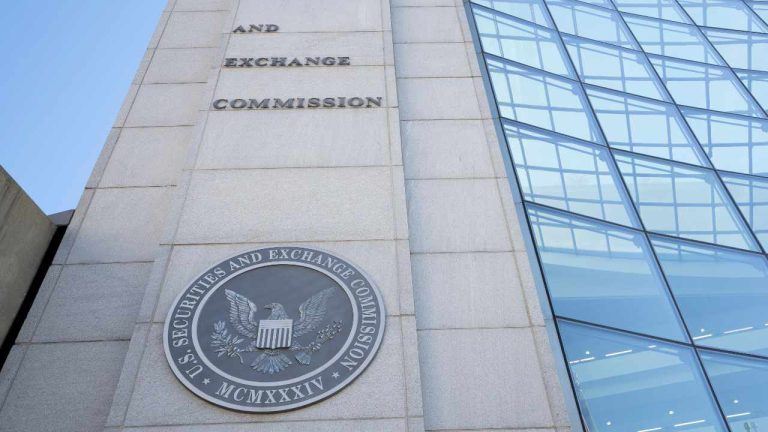 The SEC’s new unit aims to crack down on crypto fraud, targeting scams and unauthorized account takeovers while promoting responsible digital asset growth. SEC Introduces Cyber and Emerging Technologies Unit to Tackle Crypto Fraud The U.S. Securities and Exchange Commission (SEC) has announced the establishment of the Cyber and Emerging Technologies Unit (CETU) to combat […]
The SEC’s new unit aims to crack down on crypto fraud, targeting scams and unauthorized account takeovers while promoting responsible digital asset growth. SEC Introduces Cyber and Emerging Technologies Unit to Tackle Crypto Fraud The U.S. Securities and Exchange Commission (SEC) has announced the establishment of the Cyber and Emerging Technologies Unit (CETU) to combat […] Singapore’s gambling regulator blocked access to Polymarket, a predictions market, considering it online gambling under their law. Offenders Face Stiff Fines or Jail Time Singapore’s Gambling Regulatory Authority (GRA) has reportedly blocked access to Polymarket, a predictions market, as part of a broader crackdown on unlicensed gambling service providers. Under Singaporean law, predictions markets like […]
Singapore’s gambling regulator blocked access to Polymarket, a predictions market, considering it online gambling under their law. Offenders Face Stiff Fines or Jail Time Singapore’s Gambling Regulatory Authority (GRA) has reportedly blocked access to Polymarket, a predictions market, as part of a broader crackdown on unlicensed gambling service providers. Under Singaporean law, predictions markets like […] Christian Angermayer, a billionaire crypto investor, has reportedly moved from London to Switzerland as the UK considers tightening tax policies on offshore wealth. Angermayer’s relocation signals the potential departure of other wealthy individuals fearing future tax hikes on non-domiciled tax arrangements. Crypto Investor Angermayer Leaves London Over Tax Concerns Billionaire crypto investor Christian Angermayer has […]
Christian Angermayer, a billionaire crypto investor, has reportedly moved from London to Switzerland as the UK considers tightening tax policies on offshore wealth. Angermayer’s relocation signals the potential departure of other wealthy individuals fearing future tax hikes on non-domiciled tax arrangements. Crypto Investor Angermayer Leaves London Over Tax Concerns Billionaire crypto investor Christian Angermayer has […]
Bitcoin OG and educator Dan Held points out which crypto assets are most likely to avoid the ongoing SEC crackdown.
Proof-of-work coins that had a fair distribution at their launch are the most likely to avoid being labeled as securities by the U.S. SEC, according to Bitcoin OG and educator Dan Held.
Last week, the SEC sued Binance and Coinbase, accusing them of offering a number of altcoins as unregistered securities. As a result, many of the tokens mentioned in the lawsuit were delisted by major trading platforms which made their price tank.
According to Held, Tokens that “had fair or transparent launches”, such as Litecoin, Dogecoin and Monero, do not match the definition of a security that the SEC is following and therefore are likely to avoid the current crackdown.
Related: SEC charges against Binance and Coinbase are terrible for DeFi
“It definitely seems like the SEC has carved that out as something that they won't be going after”, he said in an exclusive interview with Cointelegraph.
According to Held, the vast majority of the tokens classified as securities by the SEC in its lawsuit against Coinbase and Binance were proof-of-stake coins, or tokens who had a pre-mined distribution, which means they have a more centralized ownership.
As Held also pointed out, the current crackdown is mainly carried out by a single government entity, the SEC, which means the level of pressure on the industry is still far from reaching the maximum level.
Held also stated that only Bitcoin and a few other cryptocurrencies that are decentralized enough will survive in the long run, as they are the only ones that can survive an all-out government attack.
To find out more about which cryptos can resist the ongoing SEC crackdown, watch the full video on our YouTube channel, and don’t forget to subscribe!

Investing in assets "outside of the traditional financial system” is the only way to preserve one’s wealth, according to the former BitMEX CEO.
The majority of people will have their wealth progressively eaten away by the devaluation of money, according to Arthur Hayes, the co-founder and former CEO of crypto derivatives exchange BitMEX.
According to Hayes, due to the huge amount of public debt accumulated by the world’s largest economies, governments will have no choice but "inflating it away" through money printing.
Thus, the only way to escape the progressive destruction of fiat wealth is by acquiring assets outside the traditional financial system, such as crypto, the purchasing power of which doesn’t fall compared with the cost of energy.
“My whole goal with all of my investing and is to preserve capital so that I can consume the same amount of energy or whatever energy amount that I would like from now and into the future,” Hayes said in an exclusive interview with Cointelegraph.
However, the amount of crypto assets available is relatively small compared with the total amount of debt in the economy, which means that only a few will be able to preserve their capital as the majority see their wealth destroyed.
According to Hayes, the crypto crackdown in the U.S. reflects the government’s attempt to keep the masses within the traditional system by preventing them from fleeing to crypto.
“They want your capital sit there and they'll make it very pleasant, pleasant journey to lose 20, 30, 40, 50, 60% of your purchasing power over a period of time such that the debt load is effectively lowered and the finances are healthier,” he said.
To find out more about Hayes’ investment thesis on crypto, check out our latest interview on our YouTube channel and don't forget to subscribe!

The latest Cointelegraph Report tries to make sense of the Security and Exchange Commission's ongoing crypto crackdown, its rationale, and the potential outcome.
The Securities and Exchange Commission (SEC), led by Chairman Gary Gensler, has been at the forefront of the United States' cryptocurrency crackdown. In the last few months, the agency has filed several enforcement actions against major crypto companies that allegedly violated security laws.
Critics say the agency has adopted a regulation-by-enforcement approach without providing a proper set of rules that fit the unique features of crypto assets. A major source of confusion is the definition of a security and whether it can apply to a highly diverse set of assets such as cryptocurrencies.
Despite being pressured in a congressional hearing last week, Gensler seems unwilling to take on the political responsibility of entering a constructive dialogue with the industry.
For many crypto companies targeted by the SEC, the choice is between entering an expensive legal battle with the regulator or shutting down operations in the US and moving overseas. Most crypto companies will likely prefer saving millions of dollars in legal expenses and opt for the latter option.
To learn more about how the SEC has waged war on crypto and the potential consequences, check out the latest Cointelegraph Report on our YouTube channel, and don't forget to subscribe!
 Kosovo police have seized dozens of crypto mining devices from residents of a majority Serb region in the north of the country. Authorities in Pristina and Belgrade exchanged accusations over the move, which has the potential to raise tensions in the ethnically divided, partially recognized Balkan state. Kosovo Government Cracks Down on Crypto Mining in […]
Kosovo police have seized dozens of crypto mining devices from residents of a majority Serb region in the north of the country. Authorities in Pristina and Belgrade exchanged accusations over the move, which has the potential to raise tensions in the ethnically divided, partially recognized Balkan state. Kosovo Government Cracks Down on Crypto Mining in […] Authorities and power utilities in various Russian regions have shut down illegal crypto mining farms, seizing hardware and taking operators to court. The action against the coin minting facilities comes amid discussions on a proposal to introduce criminal liability for miners breaking the upcoming legislation for the industry. ‘Underground’ Crypto Mining Farms Shut Down Across […]
Authorities and power utilities in various Russian regions have shut down illegal crypto mining farms, seizing hardware and taking operators to court. The action against the coin minting facilities comes amid discussions on a proposal to introduce criminal liability for miners breaking the upcoming legislation for the industry. ‘Underground’ Crypto Mining Farms Shut Down Across […] Caitlin Long, CEO of crypto bank Custodia, criticized the U.S. government for its handling of a massive crypto fraud that occurred months before the company’s collapse. She made her remarks in a blog post after disclosing evidence to law enforcement. Long’s post followed Custodia’s unsuccessful application to become a member of the Federal Reserve System, […]
Caitlin Long, CEO of crypto bank Custodia, criticized the U.S. government for its handling of a massive crypto fraud that occurred months before the company’s collapse. She made her remarks in a blog post after disclosing evidence to law enforcement. Long’s post followed Custodia’s unsuccessful application to become a member of the Federal Reserve System, […]
The group's policy head doubted a divided Congress can create crypto legislation but said it doesn’t give regulators absolute authority in the interim.
Despite attempts to police cryptocurrency through enforcement actions, United States financial regulators “are bound by legal reality” and Congress will ultimately decide crypto regulations the policy expert for the crypto advocacy group Blockchain Association has suggested.
The association's chief policy officer, Jake Chervinsky, shared his views in an extensive Feb. 14 Twitter thread on the state of crypto policy.
He noted neither the Securities and Exchange Commission (SEC) nor the Commodity Futures Trading Commission (CFTC) “has the authority to comprehensively regulate crypto.”
14/ No matter how many enforcement actions the SEC and CFTC bring, they are bound by legal reality:
— Jake Chervinsky (@jchervinsky) February 14, 2023
Neither has the authority to comprehensively regulate crypto, neither can obtain it through any amount of enforcement, and neither will ever have it without an act of Congress.
Chervinsky believed a deal on crypto legislation seems “unlikely, given the ideological gap between House Republicans and Senate Democrats.” He accused the SEC and CFTC of overstepping their authority in an attempt to “get things done” without Congress.
Chervinsky called for the industry to remain calm following the recent flurry of activity from “crypto’s chief antagonist,” the SEC, and pointed to its crackdown on staking services as an example.
13/ The SEC's main tactic is regulation by enforcement, and it struck again last week by labeling Kraken’s staking service a security.
— Jake Chervinsky (@jchervinsky) February 14, 2023
That's frustrating, but it doesn't change much for anyone else. Settlements aren't the law, and every set of facts is unique. Others will fight.
The SEC’s Feb. 9 settlement with crypto exchange Kraken, that banned the exchange from ever offering staking services to U.S. customers, was publicly rebuked by SEC Commissioner Hester Peirce.
In a Feb. 9 dissenting statement, Peirce argued that regulation by enforcement “is not an efficient or fair way of regulating” an emerging industry.
Related: US lawmakers and experts debate SEC's role in crypto regulation
Chervinsky suggested litigation is one way the crypto industry can push for good policy, noting the judiciary plays an important role in dictating policy that has been “ignored.”
20/ FIFTH, we can litigate.
— Jake Chervinsky (@jchervinsky) February 14, 2023
Policy is made in all three branches of government, and we’ve ignored the judiciary for too long.
At the core of crypto is a fight for civil liberty, a fight that calls for impact litigation.
Our best allies may be in the courts. Let's go find them.
Crypto exchange Coinbase also faces an SEC probe similar to what resulted in Kraken’s settlement.
Coinbase CEO and co-founder, Brian Armstrong, has taken a more resolute stance, claiming that getting rid of crypto staking would be terrible for the U.S.
Armstrong argued in a Feb. 12 Twitter post that Coinbase’s staking services are not securities and would “happily defend this in court if needed.”
Coinbase's staking services are not securities. We will happily defend this in court if needed.https://t.co/GtTOz77YV3
— Brian Armstrong (@brian_armstrong) February 12, 2023
Judge’s rulings in landmark cases create a legal precedent. If such a case were brought to court and a judge decided Coinbase’s staking services did not classify as securities, other crypto companies in a similar position could use the precedent as part of their defense.